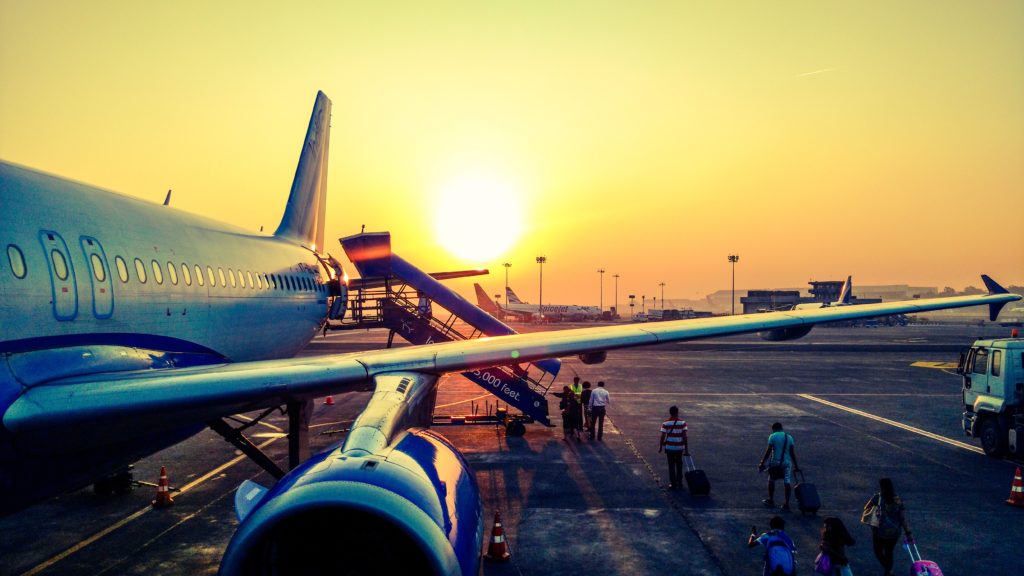CBD is now available in everything from coffee to bath bombs, lotions, and even CBD oil dog treats. It is an emerging and flourishing topic in the health and wellness space. Many travelers are confused about its legality, especially when taking such products on a flight or traveling internationally.

Traveling with CBD:
Though travel may be restricted now, people will want to take the CBD-infused items with them before getting on that plane once things start opening up. Here are a few things that everyone should know about while traveling with CBD.
First, let’s look into what CBD is. It is a non-psychoactive cannabinoid found in hemp and cannabis – it is derived from the hemp plant, not marijuana. It contains only a small amount (less than 0.3 percent) of THC, which is the psychoactive compound that makes users feel “high.” Such trace amounts of THC do not produce any noticeable intoxicating side-effects.
Thanks to many laws being passed, hemp and hemp-derived products, such as CBD oil, are now legal. However, the CBD must be hemp-derived, which is different from being derived from the marijuana plant. Marijuana and hemp belong to the same species of plants. However, they are different- with hemp being usually described as non-intoxicating cannabis for industrial use of the products derived from it.
Since hemp-derived CBD is hundred percent legal in the United States, law-enforcement shouldn’t give anyone a hard time traveling with CBD. Hemp also comes in a form that looks very much like cannabis, which can pose a problem if you are stopped by the police, who may choose to detain you until they can ensure that it is hemp and not marijuana. Fortunately, CBD can now be found in many different things such as gummy’s, sodas, chocolates, conditioners, moisturizers, shampoos, capsules, tinctures, etc.
First, let’s talk about traveling with CBD oil domestically. The type of CBD that comes from hemp oil is legal at the federal level and is therefore allowed to be taken across state borders and flights. The CBD derived from marijuana is still illegal in some states, so it is recommended that you look into the state‘s laws while traveling across state borders.
You can differentiate between the two types of CBD by reading the product label to identify the amount of THC it contains. The only hemp-derived CBD oils with no more than 0.3 percent of THC levels are legal to fly with, so make sure you check that.
Because the origins of a specific product and its THC levels can sometimes be challenging to ascertain, many states are still reluctant to legalize CBD. In Texas, for example, any CBD product with a THC level greater than 0.0 percent remains illegal unless it has been prescribed or recommended by a qualified doctor to treat epilepsy. In that case, a patient could be given a product that contains no more than 0.5 percent THC.
The Food and drug administration (FDA) has also added another level of restriction to the legality of CBD. According to the FDA, CBD is not allowed to be added to food, cosmetic products, beverages, or supplements. For this reason, many states – even where marijuana products have been made legal for recreational use – have decided to ban CBD as a food additive.
CBD’s legality is tricky because of rapidly shifting regulations and confusion surrounding the difference between hemp and marijuana. Because of this, there are often different opinions and a disconnect amongst law enforcement officials.
CBD helps travelers relax as it reduces stress and anxiety and is also known to help with jetlag. Daily CBD Mag has a helpful article about CBD oil.
As long as it is clearly labeled, it should not be a problem to keep it in your carry-on while flying. It is still recommended that you don’t take CBD products that resemble and look like marijuana, as it could prolong your security check and add unnecessary stress to your trip.
International regulations and rules on CBD are, of course, more complicated if your itinerary includes multiple destinations. It is of the utmost importance to research the country’s laws that you’re traveling to while traveling abroad. Many countries have much stricter drug lawyers, and professionals strongly advise playing it safe and leaving products with any cannabinoids at home if you are unsure of the laws.
Regulations for CBD oil when it comes to cruises are also varied. Some cruise lines ban it together, so the best option would be to contact the cruise line directly in such a case. Do not forget that there are security scanners as you board a cruise ship, so don’t try to hide your CBD products.
CBD oil offers many benefits for travelers, mostly as it regulates the body‘s immune system, organs, and neurotransmitter systems, helping with traveling symptoms like sleeplessness and tiredness, amongst others. It is especially recommended for long flights to decrease soreness and stiffness, help regulate sleep patterns with the time change, and help reduce anxieties known to affect people while in the air. Kyro has a helpful article where you can read more about CBD oil.
The regulations are so new that some TSA agents might not yet be familiar with the products, which could lead to some delays in your travel plans. However, more agents are being briefed on new regulations, so as long as you have taken the necessary precautions, it shouldn’t be a problem.
Needless to say, though, you should take the required cautionary steps and check the CBD oil possession laws of both the state/country you are traveling to and the state/country you’re traveling from. It is also recommended that you print out the product lab report and have it available if you are needed to verify the cannabinoid content to any enquiring authorities. And of course, if you’re traveling with CBD products as a medication, you should always keep the prescription handy just like you would with any other prescribed medicine.





